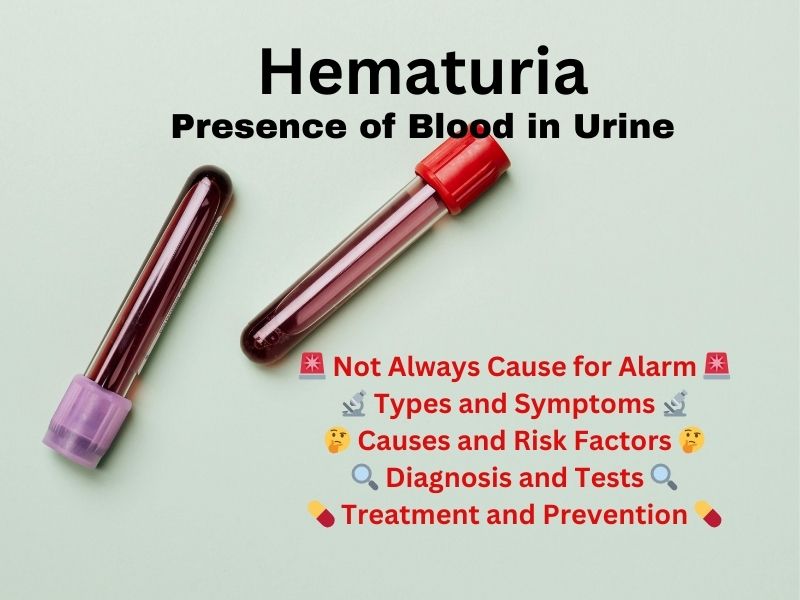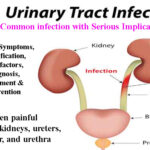Blood in urine medically known as “Hematuria” can also signify a serious disorder. Hematuria has no specific treatment. If the underlying condition isn’t serious, no treatment is necessary.
Seeing blood in urine may cause anxiety. However blood in urine medically known as “Hematuria”- isn’t every time a subject for concern. Laborious exercise, drugs, with aspirin can cause blood in urine. But urinary bleeding can also signify a serious disorder.


Symptoms:
The noticeable symptoms are pink, red or cola-colored urine — because of the presence of red blood cells. It takes very less blood to create red urine, and the bleeding generally isn’t painful. If blood clots are also noticed in urine with pain. A lot of times, though, bloody urine occurs without other signs or symptoms. In many cases, blood in urine is noticeable only under a microscope.
Although many cases of hematuria aren’t serious. Keep in mind that some medications and certain foods can cause urine to turn red. A change in urine colour caused by drugs, food or exercise usually goes away within a few days. Yet, one can’t automatically attribute red or bloody urine to medications or exercise, so it’s best to see doctor anytime when blood is noticed in urine.
Causes
In hematuria, kidneys — or other parts of urinary tract — allow blood cells to leak into urine. A number of problems can cause this leakage, including:
- Urinary tract infections.
- Kidney infections
- A bladder or kidney stone.
- Enlarged prostate.
- Kidney disease.
- Inherited disorders like Sickle cell anaemia
- Kidney injury.
- Strenuous exercise.
Risk factors
Almost anyone — including children and teens — can have red blood cells in the urine. Factors that make this more likely include:
• Men above 50 years of age have rare hematuria because of inflamed prostate gland.
• More than 50% of the women will have a urinary tract infection once in their lives, perhaps with some urinary bleeding.
• Younger men are more probable to have kidney stones or Alport syndrome, a form of hereditary nephritis that can cause blood in the urine.
• Kidney swelling after a viral or bacterial infection (post-infectious glomerulonephritis) is one among major causes of urinary blood in children.
• A family history of kidney disease or kidney stones is more prone to urinary bleeding.
• Aspirin, nonsteroidal anti-inflammatory pain relievers, and antibiotics (penicillin) have higher risk of urinary bleeding.
• Long-distance runners are particularly at high risk. Indeed, the condition is sometimes known as jogger’s hematuria. But anyone with strenuous work can get symptoms.
Tests and diagnosis
To find a cause for urinary bleeding, the following tests and exams play a key role:
- Physical exam
- Urine tests
- Imaging tests internal organs.
Treatments and drugs
Hematuria has no specific treatment. Instead, doctor will focus on treating the underlying condition. This might include antibiotics, a medication is to shrink an enlarged prostate, or shock wave therapy to break up bladder or kidney stones. If the underlying condition isn’t serious, no treatment is necessary.
Prevention
It’s generally not possible to prevent hematuria, though there are steps to reduce risk of some of the diseases that cause it:
1. Urinary tract infections. Drinking ample of water, so that its throughout of body by urinating. After intercourse, at the earliest possible wipe from front to back, after urination. Avoid irritating feminine hygiene products to reduce risk.
2. Kidney stones. Drink more water and limit salt, protein and oxalate-containing foods, such as spinach and rhubarb.
3. Bladder cancer. Stop smoking, avoid exposure to chemicals and drink ample of water to reduce the risk of bladder cancer.
4. Kidney cancer. Stop smoking, maintain a healthy weight, eat a healthy diet, stay active and avoid exposure to toxic chemicals.
Dr. Ramesh Reddy G











